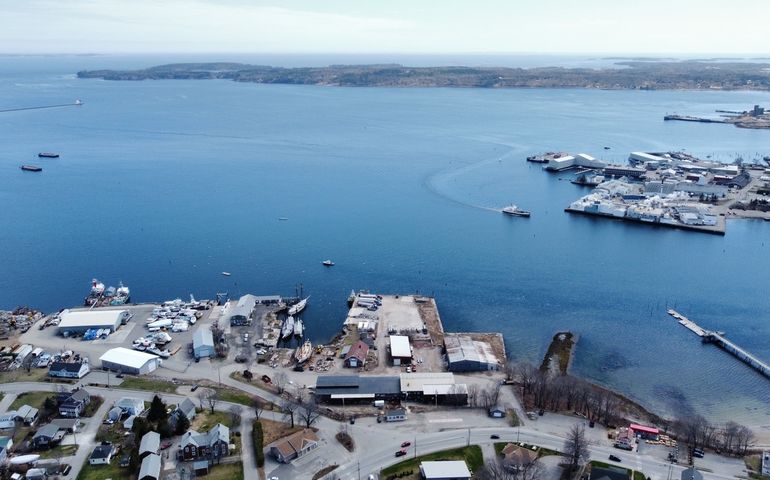Rockland mulls impact of proposed three-fer property sale on working waterfront
 Courtesy / F.O. Bailey
In this aerial view of the Rockland waterfront, North End Shipyard is the U-shaped basin occupied by three schooners, with a fourth schooner getting ready to launch. Schooner Wharf is to the right and Steel-Pro is the set of buildings below that.
Courtesy / F.O. Bailey
In this aerial view of the Rockland waterfront, North End Shipyard is the U-shaped basin occupied by three schooners, with a fourth schooner getting ready to launch. Schooner Wharf is to the right and Steel-Pro is the set of buildings below that.
The proposed sale of three commercial waterfront properties in Rockland could bring new development and new tax revenue, but could also put pressure on shrinking working waterfront space, perhaps changing the community forever.
The potential sale, announced earlier this month, would package together properties that in total span 8.77 acres of land and waterfront infrastructure, include more than 55,000 square feet of industrial space, and nestle between the harbor and Main Street at the north end of the city’s downtown.
Current businesses there represent a cross-section of Rockland. They include Schooner Wharf, which offers deep-water berthing for ships, Steel-Pro Inc., which manufactures stainless steel tanks and other industrial items, and North End Shipyard Inc., a marina and boatyard that serves passenger schooners.
Going from a steel manufacturer and tall ships marina to potential boutique hotels and shops could be a shock for Rockland and mean a loss of working waterfront and space for traditional businesses there, experts said.
“When you’re putting a large part of the working waterfront up for potential development, it can fundamentally change the nature of a community,” said Sam Belknap, senior community development officer of the nonprofit, Rockland-based Island Institute. “Once a piece of working waterfront is gone — it’s gone forever.”
The properties are being marketed as development opportunities for hotels, restaurants, retail or office space, residential or marine usage.
“Working waterfront is getting squeezed by development pressures, which are becoming even more tremendous as Maine real estate gets even more valuable,” Belknap said. “The pressures are never going to go away — financial pressures, climate change, development pressures. But working waterfronts are the critical underpinning of the blue economy for the state of Maine.”
The blue economy is the sustainable use of ocean resources for economic growth, improved livelihoods and jobs, and ocean ecosystem health, according to the World Bank.
Voices pro and con
Given the vast potential change from the businesses currently occupying the land, experts said the community should have a say about what development happens there.
Natalie Springuel, marine extension associate with Maine Sea Grant, suggested Rockland, or any town facing changes to a working waterfront, first do an assessment of who the users are.
“There are businesses that are reliant on the waterfront. From a commercial perspective, it’s difficult to do work elsewhere. For some users, their entire livelihood is dependent on accessing the shore,” Springuel said.
“Private waterfront parcels have the right to do what they want but the challenge is that when a working waterfront changes hands, it’s gone for good. If enough properties change, overall options for waterfronts see a cascading array of issues. including public waterfront access that becomes busier and more congested.”
Municipalities need to look at what constitutes a working waterfront and issues such as accessibility at various tides, nearby parking, access to fuel and workspace, hoists or infrastructure, Springuel added.
The city of Rockland has said it supports a balanced approach.
“The city is committed to keeping a balance of working waterfront and growth on the waterfront. Growth is important to keeping taxes down and as long as growth is a well thought out plan, all can benefit from growth on the water,” Tom Luttrell, Rockland’s city manager, told Mainebiz.
As long as an owner develops what is allowed in the zone, any future use will only have to go to the Rockland Planning Board, Luttrell said. The board will notify businesses and residents within 300 feet of the property lines and hold a public hearing.
Luttrell said it was difficult to comment on the potential sale and development because it was too early to know what would happen. He said he has not heard any concerns yet, but noted that they generally come after someone purchases a property.
“If this property was to sell to a developer, the city’s vision would be to follow the comprehensive plan and maintain a view corridor with the potential of expanding the harbor trail along the waterfront,” Luttrell said.
Mainebiz web partners
This is why I will never own land or a business in Rockland. Its government has been overstepping its authority for decades. Now it believes it can tell landowners who they can sell to.














1 Comments